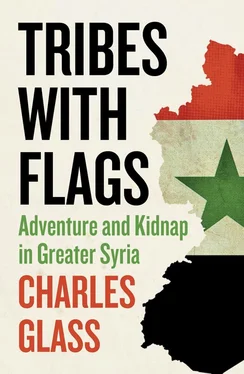“Very old,” I said.
“Then you see library,” he promised.
“How old is that?”
He wrote again on the paper and handed it to me. “1868.”
We had not reached the relics of Alexander’s invasion, but we were headed, as far as time goes, in the right direction. We walked past the Roman Catholic Church of the Annunciation, but he did not stop there. He merely pointed at it, saying, “Church very old,” and continued across a small, leafy side road to the library. Mehmet Udimir took me into a shaded courtyard behind a stone wall and into a building which looked as though it had once been a large private house on two floors. We walked upstairs, passing reading rooms where schoolchildren were studying. On the walls of each room were portraits – some of them photographs, others prints of oil paintings – of the father of modern Turkey, Moustafa Kemal Atatürk. An Islamic historian in Beirut had once told me, “Atatürk was a man of contradictions, even in his name: Moustafa means ‘chosen one’, Kemal means ‘perfection’, Atatürk means ‘Father of the Turks’. Yet he was neither chosen nor perfect nor even a Turk.”
We walked into an office, and I sat down on one of three wooden chairs facing a large desk. Mehmet sat behind the desk and under another portrait of Atatürk. This painting was almost life-size, in full colour, and showed Atatürk in white tie and tails, his arms casually folded, looking handsome and rather like Noël Coward. His red hair, blue eyes and reddish lips looked anything but Turkish, and it was little wonder his enemies had accused him of having a Greek father and a Jewish mother.
An ancient man, wearing an old, baggy suit, shuffled slowly into the office carrying a tray with glasses of tea on it. His facial features were like a Mongolian’s. He said nothing to either of us, but put the glasses on the desk. It was clear that Mehmet Udimir was not merely the director of tourism in Alexandretta, he was also the chief librarian. I felt as though I’d strayed into one of those small American towns in which the same man, simply by changing hats, served as policeman, judge, fire chief, mayor and coroner. I was certain that if I asked Mehmet to take me to the head of the chamber of commerce, we would walk into another office, where he would sit down behind another desk and another old man would bring us tea. That way, I could confirm the answers to my questions to the tourism director with quotes from the chief librarian and the head of the chamber of commerce. It was an old journalistic trick, but one Mehmet inadvertently prevented me from playing by never telling me anything.
Another old man, better dressed and more distinguished, came into the office. He must have been in his late sixties, and he had a trim moustache. After shaking my hand, he sat down. “I was his teacher,” he said in English, indicating Mehmet. “I am free now.”
“Retired?”
“Yes,” he said. “I come to see Mehmet one day each month.”
Mehmet smiled and appeared to ask him what he had said. They then spoke for a minute in Turkish.
“And you?” the retired teacher asked. “You are tourist?”
“Sort of,” I explained. “I am writing a book.”
“You are going to Antakya?”
“Yes.” Antakya was Turkish and Arabic for Antioch, the city in which the disciples of Christ were first given the name “Christians”.
“In Antakya, you are to look at two places famous, the church and the museum.”
The first old man returned with more tea, served as everywhere else in the Levant hot in clear glasses with no milk and much sugar.
We were talking when a thin young man with black hair, a short black beard and a hawk’s nose, came in and sat down. The retired teacher told me the young man had recently returned to Alexandretta from Istanbul after the death of his father. The father’s restaurant had closed, and he had come to arrange his family’s affairs before returning to Istanbul. The young man, in his mid-twenties, spoke a few words of English, rather like Mehmet. He offered to help me find my way around Alexandretta. His name was Munir. He told me he was half Turkish and half Iranian.
Friends in Beirut and Damascus, I said, had given me the names of people to see in Alexandretta, traders named Makzoumé and Tanzi. Mehmet tried to telephone Tanzi for me, but there was no reply. He could not find a number for Makzoumé, so he asked Munir to take me to the Makzoumé Shipping Company nearby. We finished our tea, and I thanked the director of tourism and chief librarian for his help. He and his former teacher said they would see me again.
It was a short distance to Makzoumé’s offices, back in the direction of the sea. The offices of the Makzoumé Shipping Company were more European than Oriental, with fitted carpets, modern furniture and paintings. There was no old man with tea, but there was an attractive secretary at a desk in an outer office. She showed us into Makzoumé’s inner office, where we sat in silence while he finished making telephone calls. He was an old man, a little overweight and well dressed in woollen trousers and a cardigan. He looked more European than Turkish or Arab, and, as it turned out, behaved more like a European than a Levantine.
While we sat waiting, he spoke on the telephone in Turkish, French and Arabic. When he finished, he asked me why I was there. He was the first person I met in Alexandretta who spoke fluent English. I was hopeful that he could guide me through my first day in his city. I explained that mutual friends, who had been his neighbours when he lived in Beirut, had given me his name as a man who would help me in Alexandretta.
“I don’t think so,” he said. He could do nothing, because he was leaving for Europe the next day. “Perhaps this young man can help you.”
“He is trying,” I said. “But he has been away from here for years, and he does not speak English.”
“I am sorry,” Makzoumé said, the resignation in his voice betraying more relief than regret.
As we left his offices, he called out, “You could try the British Consul.”
Munir and I walked to the Catoni Maritime Agencies, an Ottoman stone building which backed onto the sea and had for years served a secondary purpose as British Consulate in Alexandretta. The front room was a shipping company and travel agency, in which a woman was preparing airline tickets for a customer seated by her desk. I asked where we could find the British Consul.
She indicated a door to another office, and Munir and I went in. The first sights to greet us on entering were three large portraits: in the centre, of course, was Atatürk, to his right was Queen Elizabeth and on his left was Prince Philip, who in Turkey, if nowhere else, was never referred to as “Phil the Greek”. The portraits of the British queen and her husband, bedecked in medals and ribbons, were nearly as dated as that of Atatürk, obviously made many years and many chins ago. Beneath the portraits sat a soberly dressed middle-aged woman, who looked as unassuming as the luminaries behind her were grand. When she saw us, she looked up from her desk with its small British and Turkish flags and smiled. “May I help you?” she asked.
She understood immediately when I explained the purpose of my journey and why I had begun in Alexandretta. She was just old enough to remember that the province had been part of Syria until 1939, although too young to have been born when the whole region was united under the Ottomans. Hind Koba, MBE, had been Her Majesty’s Consul in Alexandretta for nearly thirty years. I told her that I had introductions to only two people in Alexandretta, Makzoumé, who had not been helpful, and Abdallah Tanzi, whose telephone did not answer.
“Abdallah Tanzi,” she said, “is my brother-in-law. We live in the same building.” She thought it would not be difficult to find him. She promised to make appointments with a variety of people who would give me some idea what Alexandretta was like and how its life had changed. Her first call was to a lawyer named Kavak, who said he could see me then.
Читать дальше












